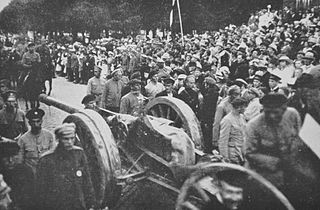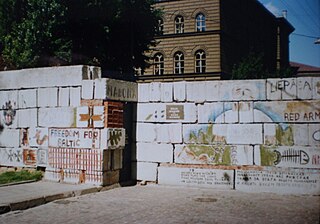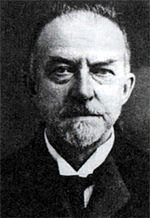
Latvia, officially the Republic of Latvia, is a country in the Baltic region of Northern Europe. It is one of the three Baltic states, along with Estonia to the north and Lithuania to the south. It borders Russia to the east, Belarus to the southeast, and shares a maritime border with Sweden to the west. Latvia covers an area of 64,589 km2 (24,938 sq mi), with a population of 1.9 million. The country has a temperate seasonal climate. Its capital and largest city is Riga. Latvians belong to the ethnolinguistic group of the Balts and speak Latvian, one of the only two surviving Baltic languages. Russians are the most prominent minority in the country, at almost a quarter of the population.
Traditional Latvian music is often set to traditional poetry called dainas, featuring pre-Christian themes and legends, drone vocal styles and Baltic psaltery.

Jānis Pliekšāns, known by his pseudonym Rainis, was a Latvian poet, playwright, translator, and politician. Rainis' works include the classic plays Uguns un nakts and Indulis un Ārija, and a highly regarded translation of Goethe's Faust. His works had a profound influence on the literary Latvian language, and the ethnic symbolism he employed in his major works has been central to Latvian nationalism.

The Latvia national football team represents Latvia in men's international football, and is controlled by the Latvian Football Federation, the governing body for football in Latvia. They have never qualified for the FIFA World Cup, but did qualify for the European Championship in 2004 under head coach Aleksandrs Starkovs.

The Latvian Riflemen were originally a military formation of the Imperial Russian Army assembled starting 1915 in Latvia in order to defend Baltic governorates against the German Empire in World War I. Initially, the battalions were formed by volunteers, and from 1916 by conscription among the Latvian population. A total of about 40,000 troops were drafted into the Latvian Riflemen Division. They were used as an elite force in the Imperial and Red armies.

Latvian Higher League or Virslīga, known for sponsorship reasons as Optibet Virslīga since 2019, is a professional football league and the top tier of association football in Latvia. Organised by the Latvian Football Federation, the Higher League is contested by 10 clubs.

Aleksandrs Koliņko is a Latvian professional football coach and a former player. He is the manager of Latvian Higher League club Super Nova.

The Latvia men's national basketball team represents Latvia in international basketball. They are organized and run by the Latvian Basketball Association. Latvia has reached the European Basketball Championship 15 times, with their ultimate success occurring during the inter-war period, when they became the first team to win the tournament in 1935. Four years later, they had another impressive run to come away with the silver in 1939. Although after 1939, Latvia were forced to suspend their national team operations, due to the Occupation of the Baltic states during World War II. Latvia regained independence in 1991, with their national team taking part in international competition once again a year later.
In Latvia, Russians have been the largest ethnic minority in the country for the last two centuries. The number of Russians in Latvia more than quadrupled during the Soviet occupation of Latvia when the size of the community grew from 8.8% of the total population in 1935 (206,499) to 34.0% in 1989 (905,515). It started to decrease in size again after Latvia regained independence in 1991 falling to 24.2% at the beginning of 2022.

The Latvian Hockey Higher League, also known as the Optibet Hockey League since 2017 due to sponsorship by Optibet, is the top tier league of ice hockey in Latvia. The league is competed by nine teams from Latvia, Lithuania and Estonia. Previously it was also known as the Latvian Open Hockey Championships and the Samsung Premier League from 2006 to 2008. The league was established in 1931.

The Latvian War of Independence, sometimes called Latvia's freedom battles or the Latvian War of Liberation, was a series of military conflicts in Latvia between 5 December 1918, after the newly proclaimed Republic of Latvia was invaded by Soviet Russia, and the signing of the Latvian-Soviet Riga Peace Treaty on 11 August 1920.

Aleksandrs Cauņa is a Latvian former professional footballer who played as a midfielder.

Cinema of Latvia dates back to 1910 when the first short films were made. The first cinematic screening in Riga took place on May 28, 1896. By 1914 all major cities in Latvia had cinemas where newsreels, documentaries and mostly foreign-made short films were screened.

The Barricades were a series of confrontations between the Republic of Latvia and the Union of Soviet Socialist Republics in January 1991 which took place mainly in Riga. The events are named for the popular effort of building and protecting barricades from 13 January until about 27 January. Latvia, which had declared restoration of independence from the Soviet Union a year earlier, anticipated that the Soviet Union might attempt to regain control over the country by force.
2010 Latvian Higher League was the 19th season of top-tier football in Latvia. It began on 9 April 2010 with the first round of games. Liepājas Metalurgs were the defending champions, having won their second league title last season.

Konstantīns Pēkšēns is one of the most prominent Latvian architects of all times. After Jānis Baumanis he is the epitome of the second generation of Latvian architects. Many Latvian cities and towns take pride in buildings designed by Pēkšēns, but Riga alone can boast more than 250 multi-storey brick buildings and a great number of wooden houses erected following his designs.
Aleksandrs is a Latvian masculine given name. It is a cognate of the name Alexander and may refer to:
Rīgas Armijas Sporta Klubs was a professional basketball club that was based in Riga, Latvia.
Events in the year 2018 in Latvia.

HK Kurbads is an ice hockey team based in Riga, Latvia. It is a member of the Latvian Hockey Higher League and also compete for the Latvian Cup, winning Latvian Hockey League in 2016–17 and 2017–18 season. The team played its home games at Vidzemes Ledus Halle in Ogre until 2017 when the new arena was built in Rumbula, Riga.













